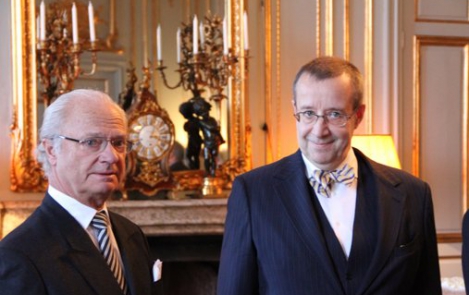-
Reset
+


President Ilves: Sweden sets an example for a number of euro zone countries
24.01.2012
“Satisfying results cannot be achieved in solving the complicated financial problems faced by Europe, without involving countries that follow conservative and responsible budgetary policies, yet do not belong to the euro zone, such as Sweden and Poland. Just like Estonia, they pay their current bills immediately, not next week – they comply with rules and meet the obligations that they have taken,” told the President, Toomas Hendrik Ilves, in Stockholm, at the end of his two-day working visit to the Kingdom of Sweden.
According to the President, Europe’s immediate future depends on solving the European debt crisis, as distrust in single countries has extended to cover the whole euro zone.
“Sweden sets an example for several euro zone countries with its financial responsibility,” President Ilves told. “This is the reason why I hope that Sweden will join the new European Union fiscal agreement, which will strengthen the euro zone; this serves the interests of both of us.”
The current financial crisis must not result in the withdrawal of the European Union and locking doors, emphasised the Estonian Head of State.
“Vice versa: being interested in closer co-operation within the European Union, we also attach importance to continued integration throughout Europe, particularly in our relations with neighbouring countries,” President Ilves told.
When speaking of co-operation between the Baltic Sea countries, the Estonian head of State described it as “excellent and bringing the region together”.
Our countries co-operate in an array of spheres, from education and the environment to cyber security and national defence, President Ilves stated, giving the Nordic Battle Group, led by Sweden, which is one of the best prepared military units in the history of the European Union, as an example.
“It is regrettable that the European Union has not used battle groups to solve crises, even if this has been required in the interests of the member states,” President Ilves told. “Estonia and Sweden agree that serious debate in Brussels is needed to settle this issue and if appropriate, the concept of battle groups should be adjusted to become more flexible. The rapid response unit cannot remain a luxury that is kept solely for training purposes.”
The Estonian Head of State acknowledged the close co-operation between Sweden and Estonia in the sphere of cyber defence: “Attaching a clear and usable output to cyber defence and cyber security in the EU’s security policies serves the interests of the European Union as whole. Establishing a cyber unit in the European Union that would support military missions is one of the ideas. The Nordic and Baltic states could and should take a stronger leading role in this matter.”
President Ilves met in Sweden King of Sweden Carl XVI Gustaf; the Speaker of the Riksdag, Per Westerberg; Minister of Foreign Affairs, Carl Bildt; and Minister of Defence, Sten Tolgfors; gave a presentation at Foreign Policy Institute in Stockholm; and met entrepreneurs investing in Estonia and representatives of the banking sector linked to Estonia, as Sweden is the largest foreign investor and largest export partner for Estonia.
Office of the President
Public Relations Department
Phone +372 631 6229




